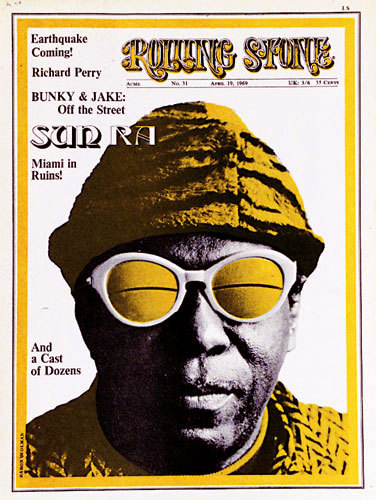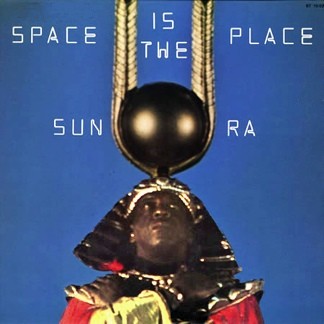Essay by Douglas Detrick, Executive Director
This is my first trip to Saturn. Unfortunately, I’ve never really investigated Sun Ra’s music, and now I’m realizing what I was missing. May 22, 2014 marks the 100th anniversary of Sun Ra’s “Earth Jubilee,” which is how he referred to his arrival on our planet. As the PJCE prepares to play a concert celebrating this singular composer and pianist, I wanted to try to understand the worldview that was so intricately connected to his music, especially for other people like me, who are newcomers to his work.
Sun Ra was famous for the story he told about himself—that he came to Earth from Saturn, and had been called by cosmic beings to “speak through music” to a world that needed him. He was born as Herman Blount in 1914, but when he took the name “Sun Ra,” he never looked back. From then on, he devoted his life to “speaking through music,” as he said, so that the all of us born on this world might listen and be helped in some way by what he had to say.
 Even though he made the cover of Rolling Stone in 1969, Sun Ra never achieved big commercial success. But, by what I’d consider a far more important measure, Sun Ra was a fantastic, unmitigated success. To continue fighting for one’s vision in a society, or an entire planet that seemed set against him, and to do it with the vibrancy, the productivity, and the sheer tenacity that Sun Ra did it is admirable on any plane of existence. This man may have been born on Earth, but by the end of his life he had built his own world, intricately designed to further his mission. We’re fortunate that his music still allowed us entry to it.
Even though he made the cover of Rolling Stone in 1969, Sun Ra never achieved big commercial success. But, by what I’d consider a far more important measure, Sun Ra was a fantastic, unmitigated success. To continue fighting for one’s vision in a society, or an entire planet that seemed set against him, and to do it with the vibrancy, the productivity, and the sheer tenacity that Sun Ra did it is admirable on any plane of existence. This man may have been born on Earth, but by the end of his life he had built his own world, intricately designed to further his mission. We’re fortunate that his music still allowed us entry to it.
When you see Sun Ra in his costumes, when you hear him tell his story and you watch the wild Arkestra on stage, don’t misunderstand. Its easy to focus on all of this drama, call it simple spectacle, and forget the brilliance of the construction of his music. Its also easy to ignore the meaning of the theatrics, to miss the point by saying that Sun Ra was an earnest and dedicated musician who’s worldview was at worst just crazy, and at best a distraction from otherwise good music. But, what’s most true is to say that Sun Ra was all of these things, all at the same time, and in addition to that, he was something else entirely.
A musician-poet? An artist-philosopher? A messenger from another world? I can’t say just what he was exactly, but I can say that all these things he felt called to do were an earnest attempt to change the world for the better. Through his persona, Sun Ra sought to build a black identity that embraced ancient African mythology—“Ra” is the Egyptian God of the Sun—rather than accepting the definitions of “blackness” that were commonly in use in his time. It seems obvious that he wanted to shock mainstream, white American culture, but I don’t think he did this just for the shock itself: he wanted to upset all of the racial, economic, and cultural barriers that kept outsiders on the outside.
But, he didn’t stop in the Africa of the past. Sun Ra looked to the timeless reaches of space for his ultimate inspiration. His story, his costumes, and untamed nature of his music grow out of his blending of Afro-centric mysticism with the African-American experience of the mid-twentieth century, but his goals were to quite literally realize the promise of another world that didn’t exist in the racially segregated world of the United States. In an interview he said “There’s a lot of division in what they call black. I’m not into division. I’m into coordination, discipline and tradition.” And this is a vision that all of us can believe in.


No comments